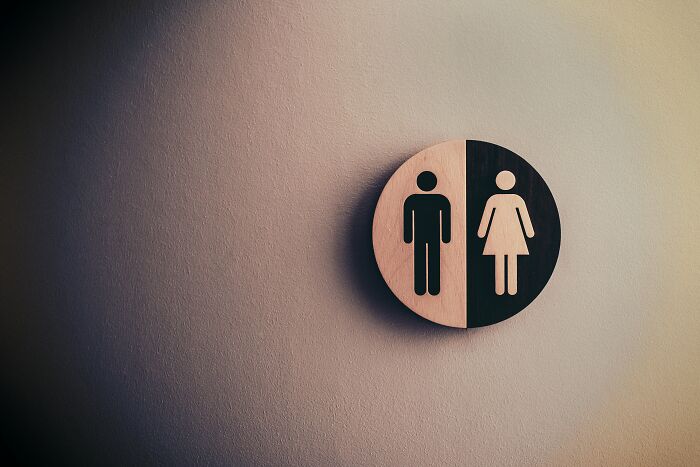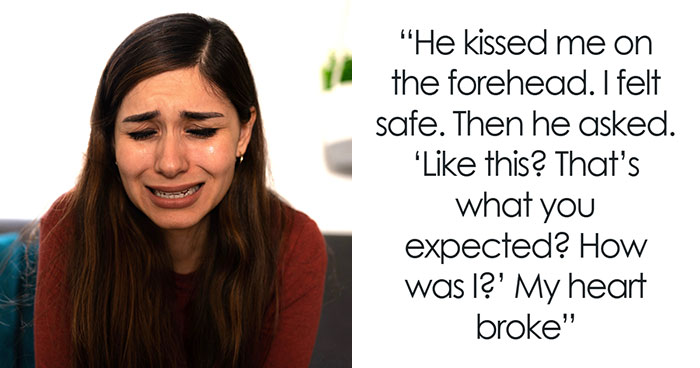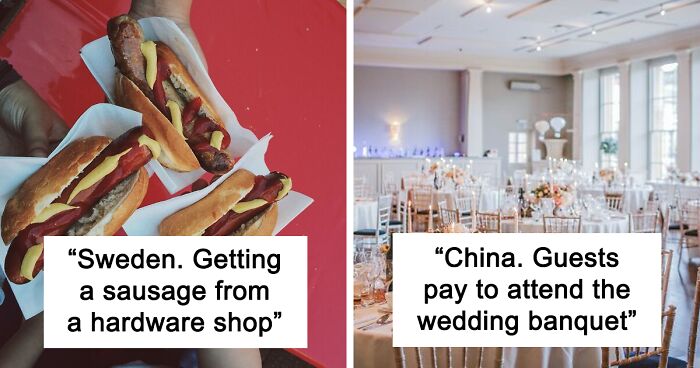
People Are Sharing 40 Things That Are Completely Normal In Their Culture But Would Be Considered Weird Elsewhere
We tend to glide through life doing countless little things every day without any second thought. But the truth is that our lifestyle, views, and values are strongly influenced by the culture we’re exposed to. And if there’s one thing we can all agree on, customs and traditions vary widely around the globe. It’s a part of what makes our beloved planet such a diverse and charming place to live, isn’t it?
Traveling is a great way to learn about the similarities and differences people share with others across borders. After all, a thing that seems ordinary to us may look totally bizarre to people elsewhere. Thankfully, with the internet at our fingertips, those of us confined to our countries can expand our perspectives from the comfort of our own homes. So one Redditor, kerris2508, decided to delve deeper into the facts about other parts of the globe.
Recently, they reached out to the 'Ask Reddit' community with a very fine question: "What is something that in your culture is normal, but in another place is a weird thing?" People jumped to type out their honestly fascinating examples, and the thread immediately became a hit. We’ve hand-picked some of our favorite responses to share with you, so check them out down below. Be sure to upvote the ones you have not heard about before, and if you know any odd quirks about your home country, let us know about them in the comments!
Psst! If you’re keen to broaden your cultural awareness even more, take a look at Bored Panda’s earlier piece right here.

This post may include affiliate links.
Let's just all get on the same page, and all agree to take our shoes off indoors, shall we?
India
Swastikas are very core of Hindu culture and you will find one (if not very many) in almost all Hindu households. Unfortunately they were hijacked by some crooked people and mean something else in whole rest of the world, since.
Among the endless list of things our environment and upbringing can tell about us, strange cultural norms are included as well. After all, growing up in any community will inevitably lead to gaining particular assumptions about the world and how everything is supposed to be. And since there is rarely one true way of doing anything, the differences between their lifestyles can vary significantly.
Anthropologists believe there are over 3,800 distinct cultures in the world, but in reality, that number is much higher. Humans are complicated little beings, so it’s almost impossible to tell the exact number of unique communities because of how hard it is to draw the line between their identities. Cultures are not restricted to specific regions or territories, and it’s possible to find countless communities with different belief systems and customs in one area. But if we can agree on one thing, every single one of them has something important to teach us.
Denmark
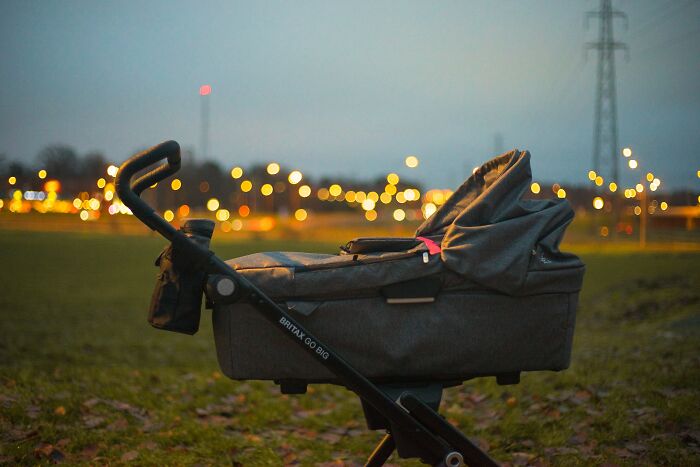 To leave the stroller (with the sleeping baby inside it) outside a café, while the mom/dad sits inside - if the weather is good. (Denmark)
Edit: It's a common thing all over Scandinavia/Scandinavian Peninsula - I'm specifically mentioning Denmark because I live here.
To leave the stroller (with the sleeping baby inside it) outside a café, while the mom/dad sits inside - if the weather is good. (Denmark)
Edit: It's a common thing all over Scandinavia/Scandinavian Peninsula - I'm specifically mentioning Denmark because I live here.
Pacific Island, Samoa Or Tonga
When getting a traditional body tattoo, you lie on the hard floor with strangers “stretching” your skin for the tattoo artist to pierce. One person is designated to wipe your blood 🩸 and excess ink and the tattoo session usually lasts over a couple of back-to-back days or a week depending on a few things. While you are being held down and your skin stretched, women fan you and sing you songs. When getting this tattoo, it’s common for you to ask someone to be your tattoo partner. Meaning the other person will have to come with and get the same tattoo as you. This is somehow meant to ease the pain, encourage you, and so they can lend some of their strength to you and also for luck so you won’t die in the process (as many did in the past from infection or whatnot). The tattoo itself is done with boars teeth or carved whale/shark bones, but nowadays some artists use steel needles. Men are tattooed from the torso to to their knees (also around the penis and almost to the butt crack). Women get it from the the knees to the top part of their thighs. After days of pain, you will have to dance for your family party to show your tattoo and to have a grateful celebration in that you didn’t embarrass your family by not finishing the tattoo.
America
 Celebrating a chubby, mystical, groundhog that can predict the end of winter based on its shadow :o
Celebrating a chubby, mystical, groundhog that can predict the end of winter based on its shadow :o
It’s impossible to become an expert in all of them, but delving deeper into the ways of life that interest you is a rewarding experience. To learn more about the benefits of discovering the unexplored territories of other cultures, we reached out to travel and lifestyle blogger Kate. She runs a successful website called Sunshine Adorer, aiming to spark our desire to go out on adventures by showing the beauty of this planet.
Kate told Bored Panda it’s very important and equally interesting to learn about other cultures, especially those that are completely different from ours. “It can help you always to understand them better,” she said. On top of that, knowing how people function elsewhere helps us when traveling abroad and motivates us to become more knowledgeable and rounded human beings.
US
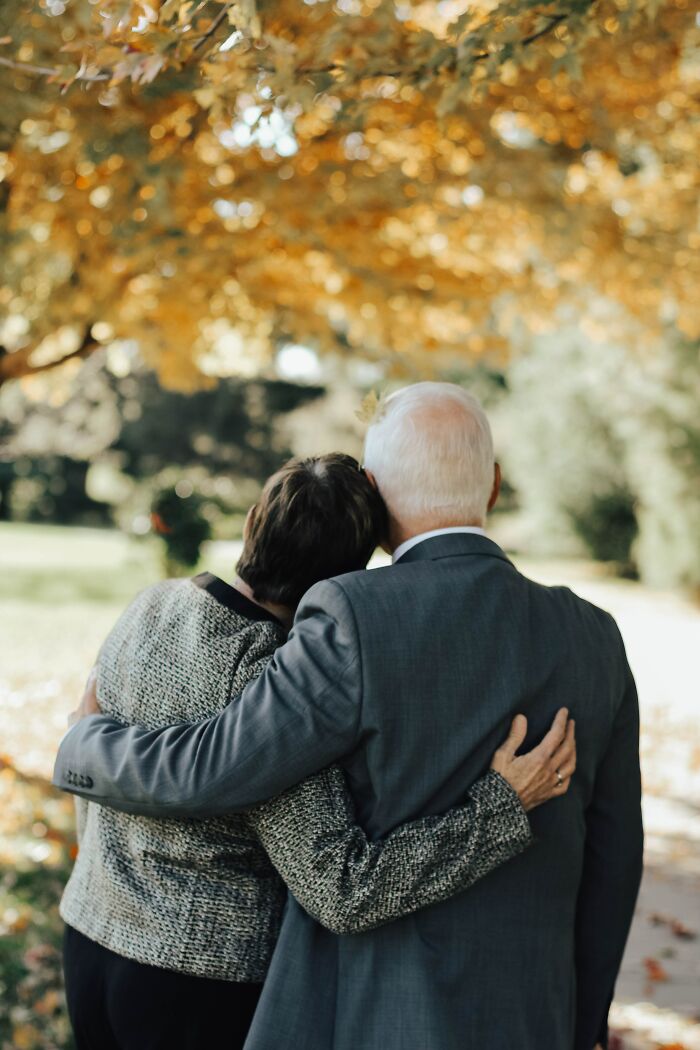 Where I live in the US, we pull over for funeral processions. It’s a respect thing and everyone does it. A friend of mine from a different part of the states saw me do this while driving once and was SO confused and made fun of me out of confusion. It’s so common I didn’t realize some people don’t do this.
Where I live in the US, we pull over for funeral processions. It’s a respect thing and everyone does it. A friend of mine from a different part of the states saw me do this while driving once and was SO confused and made fun of me out of confusion. It’s so common I didn’t realize some people don’t do this.
I'm from California and we do this too. It's considered extremely rude to cut off a car in a funeral procession. There is usually a 1st car and end car with signs that say funeral so ither drivers know
Driving long distances. In Canada and the US (and I assume other large countries) people don’t think anything of driving 3-4 hours round trip in a day and driving longer distances for a longer stay. I’ve spoken to people in the UK who think driving an hour is an incredibly long distance.
While “cultures have many parts you can explore, I like to start learning about the differences in the daily lifestyle of other nations. Anytime I travel to a new place, I am curious about what kind of food they have and how they live/work on a daily basis. After that, you can move on to learn more about their tradition, history, language or whatever you are interested in,” the travel blogger said, adding that you can go as deep into exploring them as you want. Or at least as much time you have to spare.
China
 Guests pay to attend the wedding banquet. Depending on who you invite, it's quite common for the newlyweds to make a decent profit.
Guests pay to attend the wedding banquet. Depending on who you invite, it's quite common for the newlyweds to make a decent profit.
Ireland
 Cheering in a pub when someone drops a glass.
Saluting magpies
saying "bye bye bye buh bye, bye now, bye bye bye, buh bye..." a hundred times before you hang up the phone.
Going to the funeral of anyone you even remotely know. Our funerals can be massive.
Waving a salute to anyone you pass on the road.
Leaving the pub without telling anyone.
Cheering in a pub when someone drops a glass.
Saluting magpies
saying "bye bye bye buh bye, bye now, bye bye bye, buh bye..." a hundred times before you hang up the phone.
Going to the funeral of anyone you even remotely know. Our funerals can be massive.
Waving a salute to anyone you pass on the road.
Leaving the pub without telling anyone.
Finland
 Being casually naked in same room with strangers, sometimes even with opposite sex. In this case, it's of course good ol' finnish sauna.
Being casually naked in same room with strangers, sometimes even with opposite sex. In this case, it's of course good ol' finnish sauna.
Is there a better way to learn about the differences in nations than packing your bag and flying off to scour them for yourself? While traveling may mean something slightly different for everyone, it is a learning experience unlike any other. It inspires people to seek out new places, immerse themselves in and embrace different cultures, and soak up as much knowledge as they can before jumping off to their next adventure. And Kate wholeheartedly agrees, saying that leaving your comfort zone to probe other lands is one of the best ways to learn from other people.
“It does not matter how much TV you watch or how many movies you saw, you can never have the same experiences as when you go there personally.” Kate pointed out that to really understand other communities, you need to “go out swimming” and feel it for yourself. “Also, there are things that you can’t see on TV, so you need to be there to perceive them.” The travel blogger explained that it’s reasonable and encouraged to have some ideas about the place you wish to see, but you can gain much more knowledge by experiencing it firsthand.
UK
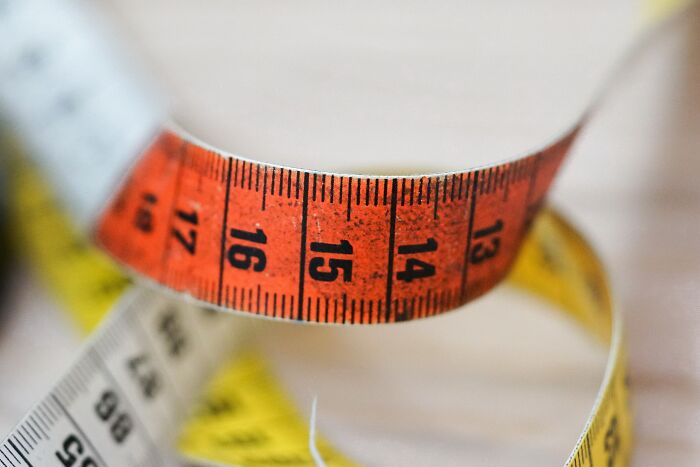 Using a puzzling mixture of metric and imperial measurements, for example, measuring cooking ingredients in grams but measuring body weight in stones.
Using a puzzling mixture of metric and imperial measurements, for example, measuring cooking ingredients in grams but measuring body weight in stones.
So can we stop making fun of Americans for using the imperial system? The UK uses mph and gallons also and feet and inches for height. Yes I know you guys can convert to either easily but still.
Nepal
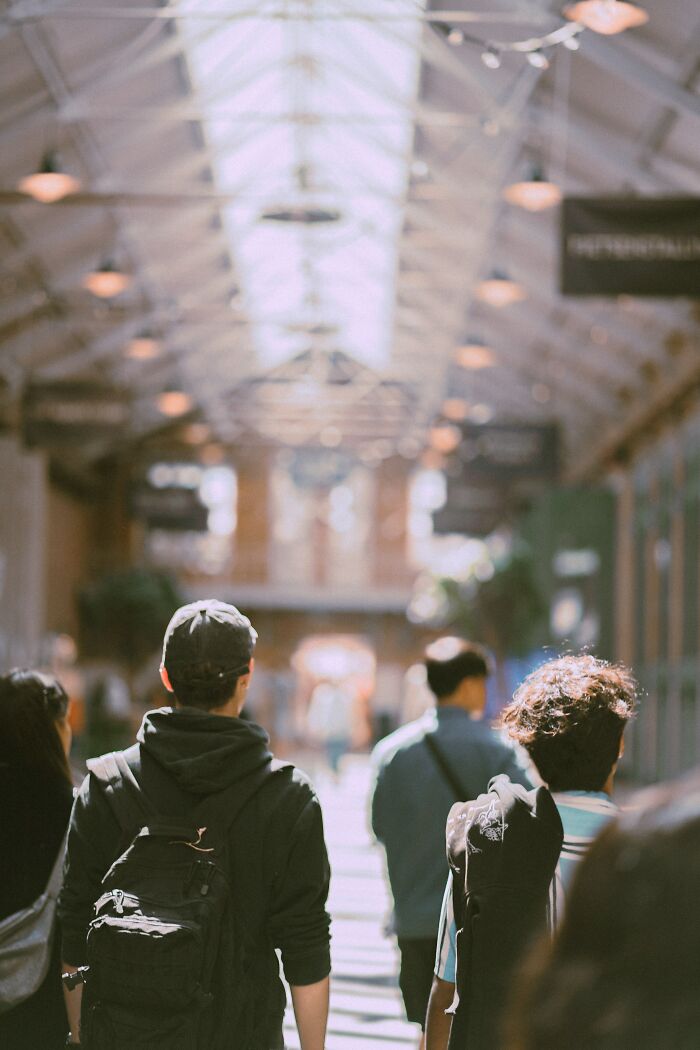 Addressing strangers using terms used for family members like brother, sister, uncle, aunty, grandpa, etc. The most common being brother/sister. We have unique words representing all 4 variations of little/big brother/sister.
And guess what, one day you would be calling a girl 'baini' (little sister), that girl be calling you 'dai' (big brother) and a couple weeks later you are dating each other and ditch the sibling style addressing. Then you either call each other by name or come up with nicknames.
Edit: I'm from Nepal.
Addressing strangers using terms used for family members like brother, sister, uncle, aunty, grandpa, etc. The most common being brother/sister. We have unique words representing all 4 variations of little/big brother/sister.
And guess what, one day you would be calling a girl 'baini' (little sister), that girl be calling you 'dai' (big brother) and a couple weeks later you are dating each other and ditch the sibling style addressing. Then you either call each other by name or come up with nicknames.
Edit: I'm from Nepal.
I think this is common for all South Asia. I'm from Sri Lanka and we also do this.
Australia
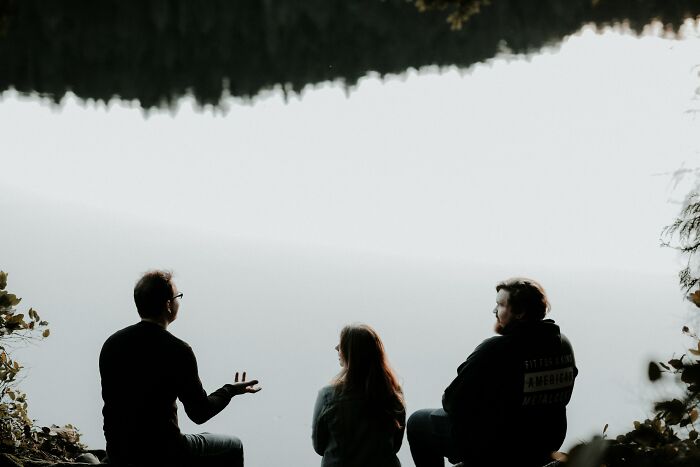 Calling someone a c**t is sometimes a term of endearment. It's all about intonation, as in "cuuuuunt", translates to "maaaate".
Calling someone a c**t is sometimes a term of endearment. It's all about intonation, as in "cuuuuunt", translates to "maaaate".
I always find it funny how Americans in particular are so highly offended by the C word. You can curse and insult their entire bloodline...but call them a c***t and that gets them.
When asked about the peculiar quirks or things from her culture that may seem odd to the rest of the world, Kate told us it’s really hard to choose them because, for her, it’s completely normal. “If I can lean on tourists’ reviews, I can say they are surprised at some foods that we eat.”
Throughout her travels, however, she has seen plenty of customs and behaviors she didn’t know about before. “What I would say about my travels abroad (and mainly out of Europe) is I had some weird surprises. When I went to countries in North Africa or the Middle East, I met local people who were rude, and I did not feel welcomed.” Kate explained this felt strange to her since she has been taught from childhood to be kind and welcoming to others, especially guests. “However, nature was beautiful and the weather was good, so in total, I did not regret traveling there.”
Canada
Hold the door open behind you a minute ahead of the next person, making the person run to it, then expect a thank you.
All East Europe
In my culture it is considered an insult to refuse food offered to you in someone else’s home if you are their guest
New Zealand
Greeting each other by pressing noses and foreheads together.
If reading the responses from this thread sparked a desire to see different cultures for yourself, Kate mentioned a few things to keep in mind before venturing into lesser-known waters. “If you travel to a country for the first time, always try to find out as much information as you can. And if you travel to farther countries or other continents, then be extra careful.”
First, find out what kind of documents you need for your trip, as well as the locations of embassies and consulates in case you need to contact them. “Then read for safety advice and useful information about the destination. Also, read more carefully about countries with different cultures or religions before you go there. Furthermore, have travel insurance.”
USA
Saying “No, Yeah” to mean yes/agree and “Yeah, No” to mean no/disagree. And “Yeah, yeah no” as fk no and “No no, yeah” as of course. Changes with inflection.
Similar in Germany, to some extent. Also in Germany, when offered something, answering "thanks" means, "no thanks".
Indonesia
Uuh lets see - living with your parents in your 20s, and when you get married it's still commonplace for the husband and wife to live with the wife's parents for the first couple of years of marriage. - Alcohol is strictly frowned upon but smoking (even from a young age) is a societally acceptable act. - Eating rice with every meal. - Being late (up to around half an hour to 45 minutes) is societally acceptable nd is sometimes expected so invitees would often push the meeting time a bit earlier. - Absolutely stuffing your guests with food. - Eating chocolate with cheese
Today especially in cities seeing people drinking alcohol seems to be okay as long as you don't make a mess with people. Eating pork on the other hand will you seen like a criminal.
Kate pointed out that arming yourself with knowledge and being prepared can absolutely save money and time, and make sure you enjoy your trip stress-free. If you consider traveling to unexplored destinations or countries where there can be potential risks for tourists, see if your friends or family members would come along. “Together is better than alone,” Kate said.
Central/ Western European Countries
Giving two kisses, one on each cheek, when meeting someone of the opposite sex.
Australia
 Saying "Hey, how you going?" as a greeting. Extremely common in Australia, but apparently it isn't used anywhere else in the English-speaking world.
Was extremely surprised when I said it to an American one day while talking online and they were confused. "What do you mean how am I going...? By car...?".
It's interesting, because it's like the perfect amalgamation of "How's it going?" and "How you doing?", but for some reason it doesn't seem to register that way for non-Aussies!
Saying "Hey, how you going?" as a greeting. Extremely common in Australia, but apparently it isn't used anywhere else in the English-speaking world.
Was extremely surprised when I said it to an American one day while talking online and they were confused. "What do you mean how am I going...? By car...?".
It's interesting, because it's like the perfect amalgamation of "How's it going?" and "How you doing?", but for some reason it doesn't seem to register that way for non-Aussies!
See above. It's not 'how you going'? It's 'owyagoin' - all one word.
Austria
Dressing up as scary goat demons that wield whips made from weeping willow branches and then visiting school and hunting down children who misbehave them and whip them all the while a few girls dressed like angels and a dude dressed up as saint nic stand and watch.
The blogger told us that even if you face difficulties on your trips, traveling is worth it. “You can have some great adventures and find loads of new friends.” She said there’s even a saying in Europe that states, “You are as many times a human as many languages you speak”. But she would only add that the more you know, the more you grow.
“Also, I would recommend to every single person to spend at least one year abroad before you start your life somewhere in your 20s. Anyone who can afford to live or work abroad or travel will definitely be a different person after that experience,” Kate concluded.
France
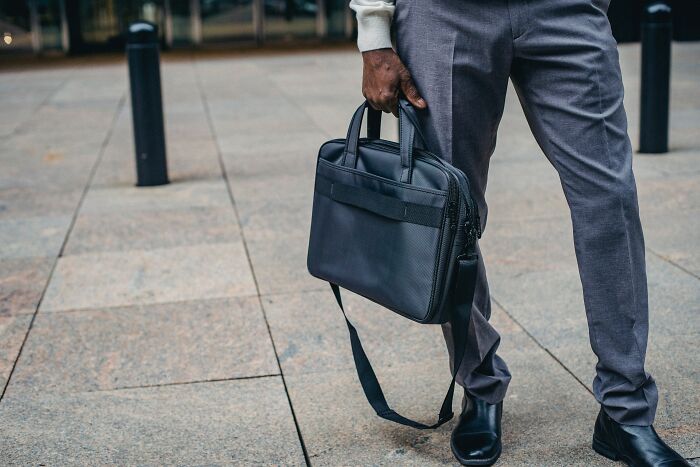 Let’s see… In no particular order:
-Giving your boss a kiss when you arrive at the office,
-Drinking one big glass of alcohol whenever we’ll you eat something, even the 6pm snacks,
-Getting mad at people who arrive early at your parties or even on time because who the f**k shows up without being at least 5 minutes late,
-Giving a nod to the fully-armed military whenever you go out in the city center,
-Preparing about three different glasses, four plates of different sizes and three sets of cutlery **per person** whenever you invite them to eat at home.
Guess where I’m from?
Let’s see… In no particular order:
-Giving your boss a kiss when you arrive at the office,
-Drinking one big glass of alcohol whenever we’ll you eat something, even the 6pm snacks,
-Getting mad at people who arrive early at your parties or even on time because who the f**k shows up without being at least 5 minutes late,
-Giving a nod to the fully-armed military whenever you go out in the city center,
-Preparing about three different glasses, four plates of different sizes and three sets of cutlery **per person** whenever you invite them to eat at home.
Guess where I’m from?
I never gave a nod to military men or saw someone do that. I'm a 55 year old French.
Africa Or India
Calling elder people aunt and uncle, even if you're not related to them.
Ireland Or Scotland
Saying all sorts of vulgar words to each other, including wishing they were dead, telling then to drop dead etc supposed to be some kinda endearment among best buddies. So it's like Bro A gonna go away from a long trip. Bro B : good, finally you're gone. Don't come back, and better die somewhere else. Bro A : I don't wanna see your face either, don't ever call me. After parting. Both A and B thought to themselves "that is a good friend indeed ".
Israel
In Israel, yelling and cursing is normal, even between bank managers and customers or people of different rank in a hierarchy. There's no politeness or etiquette. We're extremely informal. Obviously, moving to Germany with that socialization earned me several police reports for insults.
Ugh I wish! Honestly if we could give it right back to customers without consequence, I doubt they'd pull the BS they try to pull.
Scandinavia
Putting parents in care homes, I've been in some cultures where that's unbelievable.
When my parents can't look after themselves they will be going to care homes. I would want the same when I can't care for myself. I don't want my kids to look after me.
Philippines
 Pointing to a direction with your lips.
Pointing to a direction with your lips.
They do it in central America also. At first, I could't understand what they meant.
Spain
Calling someone a monkey isn't racist here it just means they are being cheeky or hyper if its a kid
India
You could just start talking with random kids and start playing with them. It isn't considered a offence in India. Also head nods and bobble.
The head bobble thing is so cute. At work we had a pair of twin sisters from India. Whenever they got excited while we were talking and they did that quick bobble plus a specific hand gesture next to their face, I had to withhold laughter and stop myself from chiming in to not offend anyone. It always looked so happy on them it made my day 😊
Germany
We build huge crosses out of straw which then are set on fire to burn the winter. I guess seeing burning crosses could make the one or other person feel uneasy not understanding the tradition
Singapore
Using a small packet of tissue paper, name card, office access card with lanyard, heck even laptops to reserve a seat at an public eatery. Once you place those items down on an empty table, it’s known to be occupied and you can then make your way to the food stall to place your food order and come back to the table you’ve reserved. When foreigners come, some may not understand this local practice and take the seats anyway, or assume that the packet of tissue left there as a form of reservation is for their use, or trash left behind by the previous user.
Iran
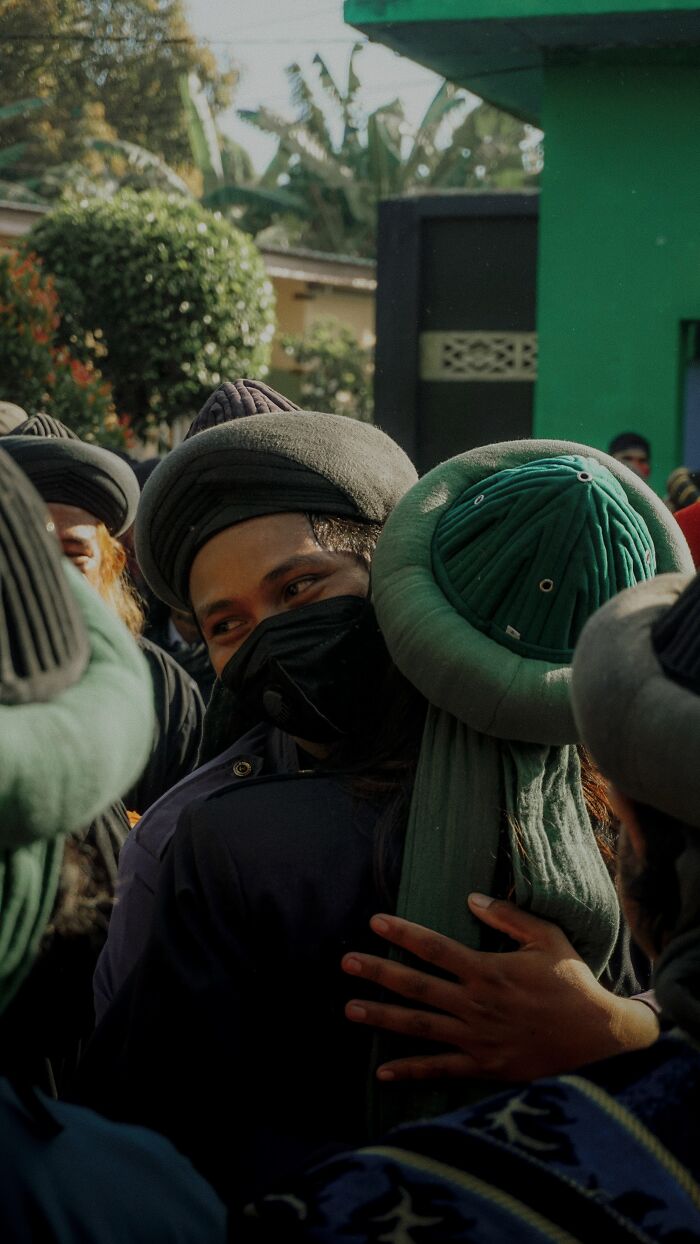 Some casual Iranian sayings of endearment:
“I want to eat your liver”
“I will sacrifice my life for you”
“My stomach is tight for you”
“Wishing your breath to be warm”
Not endearing, but “dirt on your head” if you are upset with someone, essentially meaning that you should be buried.
Some casual Iranian sayings of endearment:
“I want to eat your liver”
“I will sacrifice my life for you”
“My stomach is tight for you”
“Wishing your breath to be warm”
Not endearing, but “dirt on your head” if you are upset with someone, essentially meaning that you should be buried.
Kenya And India
 I wouldn't say this is part of my culture, but in both Kenya and India, when you go to the movies they play the national anthem on screen before the trailers and everyone has to stand up. I'd been away for so long that I'd completely forgotten this craziness and was visiting my mum, went to watch a movie, everyone stood up and I was so confused until the memories were unlocked.
I wouldn't say this is part of my culture, but in both Kenya and India, when you go to the movies they play the national anthem on screen before the trailers and everyone has to stand up. I'd been away for so long that I'd completely forgotten this craziness and was visiting my mum, went to watch a movie, everyone stood up and I was so confused until the memories were unlocked.
They used to do that in the UK too but at the end of the show. Everyone would try and leave a little early so they did not get caught and have to stand still. The massive stampedes finally stopped the practice.
Germany
eating raw pork Mettbrötchen (seasoned, raw minched pork on a bun, optional onions, salt, and pepper) is a pretty cheap and delicious snack or meal in Germany and some surrounding countries. Shouldn't be attempted elsewhere since raw pork isn't safe to eat unless you know it's fresh. Mett is made specifically to be eaten raw and has to be made fresh on the day and either eaten, cooked or frozen (to cook later) on the same day. If your country doesn't have this kind of standard you shouldn't try it unless you trust your butcher with your life. Edit: a lot of people pointing out Trichinosis as the main issue, and after into looking into it for a bit it seems that testing samples of every piece of meat meant for Mett production has to be done by a vet to verify that it’s free of parasites. I’m assuming this is what’s not being done in places where it’s not normal to eat raw pork, because if you’re gonna cook it anyway, you’re also killing the parasites.
India
Here are some famous ones! 1. Touching someone's foot as to give them respect (Usually Young children touch elder's foot, which symbolizes them giving respect to the elderly) (only people who are lower can touch a person's foot who is higher, in whatever be the circumstance). I can touch my father's foot, as he is older than me. If I teach my friend something, who's technically older than me, he can touch my foot, because im his teacher... 2. Pointing(objects close to you) with your middle finger (Ive done this many times unknowingly) 3. Touch NOTHING with your foot. All objects have 'god' inside them, so touching god(higher power than you) with your foot is like showing disrespect. So whenever you need to pickup that fallen book/pencil, you bend down and pick it up with your hand
India
Eating with the hands, but only the right hand because you clean your a*s with the left hand
My mum told me that when I was a small child and I would not eat at Indian restaurants, ever. I thought she meant they don’t use toilet paper after pooping, then head straight to the kitchen to cook. Anyway, I’m in my 40’s now and have been enjoying Indian food (from restaurants) for over 20 years now.
Poland
 beating women with a bundle of twigs, throwing cold water at them and then spraying them with cologne as a part of folk tradition on Easter
beating women with a bundle of twigs, throwing cold water at them and then spraying them with cologne as a part of folk tradition on Easter
USA
I'm from deep south US but currently live in Northern US........ apparently it's normal for people to not bring a dish when they are invited for dinner or to a party unless it's called a potluck. Where I'm from, if you don't bring something it's disrespectful. Just for context I'm in Western Pennsylvania and everyone that I know around here has said the same thing. The way it got brought up was my boyfriend was invited to dinner one night at my house (I live with my oldest sister and her husband) and he just showed up, ate, and left. My sister brought up how it was weird (we were born in the same place) and of course I agreed but I said maybe it was just something they do up here. Normally, where I'm from, we feed you til you're about to pop, always bring a dish, and always offer to help with the clean up. I've lived up here for a while now and I asked my coworkers who say they've never heard of this either. Like I was brought up that this was manners.
I was born in Southern Illinois, and it is very much ingrained in us that we when we receive an invitation to someone's home is, "What can bring?" If the say nothing, I buy a bottle of wine or similar host/hostess gift. When the meal is over, I help with clean up in some way.
Australia
Buying your 5 year old daughter a pair of thongs. In Australia flip flops (the shoes) are called thongs.
I think the bathing suit "thongs" got its name from the Y-shaped strap, known as a toe thong.
Indonesia
Swearing using body parts, for exampe if we angry at someone we would yell "YOUR EYES" or "YOUR HEAD!" or even "YOUR KNEES!"
Japan
Poking each other's anuses with our fingers in school with friends as a prank. It's so gay that it's straight
My niece went around doing that to statues when she was visiting here from Japan, I thought she just watched too much Naruto until her dad explained the ancient practice of kanchō to us. :p
Panama
My culture is very sex positive and flirty. Compliments, touchiness and being upfront with your intentions is seen as a good thing. Move to North America and it was a culture shock all the unnecessary steps people take here if they want to sleep with someone. Like damn, is it that hard to just do the nasty without caring what others might think?
Different strokes for different folks. I don't think machismo is all that positive., especially for women.
Us
Apparently thanking bus drivers
India
Bartering instead of paying the asking price
That explains the "Our prices have been pre-haggled" signs you can see in cities with lots of immigrants.
Spain
Calling people nicknames by their appearance if you don’t know they person like for example we could see someone random in the streets and we need help with SM and the person is skinny the just scream “skinnyyyy” which is “FLACO”
Peru
eating guinea pig
In the Peruvian Amazon basin women make cassava beer by chewing it and spitting into a pot for fermentation by salivary enzymes
USA
Hot dish and jello salad. Waiting for the bus in -30 degree weather because “it could be worse!”. The kindest community I’ve ever met. One time I got stuck in a snow bank trying to get on the city bus and everyone around me helped pull me up and onto the bus
India
1- Giving money at every event. Someone gave birth? You give them money. Someone got married? You give them money. Someone died? You give their closest relatives money. Someone is sick? You give them money. 2- Traditional and long ( so long it can take hours) oratory art, particularly at a funeral and a wedding. 3- Having the weirdest congratulations/wishes. IE at a wedding : We hope you have 7 boys and 7 girls. If you encounter someone who survived an accident: Congrats for still having a living heart and soul. 4- After a funeral, you have to jump above a flame lit at your doorstep otherwise the angel of death will follow you. 5- Most people wake up at 5am to go to work, some people start to sell vegetables at 4am.
Czechia / Slovakia
On Easter we go to the Koleda. Koleda is, in most places, that guys go from house to house singing/saying rhymes and then whipping a*s of the women in the house with pomlázka (entwined rods of willow). And then the women give them reward (eggs, or alcohol shot for older guys and chocolate for kids). As you can imagine not many younger women are keen on this tradition. I was lucky to be born in village where only kids go to koleda and not grown men who get drunk in process and then start to whip with more force than necessary. And we also unwrap our christmas presents on evening of 24th of December and Ježíšek (Baby Jesus) brings them - which is irony because we are super atheistic nation lol.
Australia
Australia: Calling your mates "d**khead" and d**kheads "mate"
When you've got half an hour, I can give you a quick rundown on all the ways 'mate' is used in Oz. Very versatile word.
Australia
Mimosas for breaky on Christmas morning. Followed by lunch and too many beers. Backyard Cricket with the family then falling asleep on the lounge.
India
Straight men holding hands
happens in africa as well which is super homophobic, so it's confusing.
Pakistan
Marrying our cousins. Completely normal tradition, and I've many family members that have multiple children from such unions who are all healthy.
UK
Putting milk in tea gets you weird looks when living abroad
Turkey
Turning a hole in dirt into an oven.
Pit barbecue is the most primitive and probably best bbq I've ever had. In Texas.
USA
People asking: 1. Why are you fat/skinny during Christmas family reunions. 2. Why I am not yet married. 3. Who I voted for in the last election.
Brasil
Normal to greet females with a kiss in informal settings. Quite common to eat shark meat, not the fins the actual fillet of the fish and probably a lot of people have eaten it under a commercial name elsewhere.
India
Yelling "TAXI!" when someone drops their drink at a bar/party
Vietnam
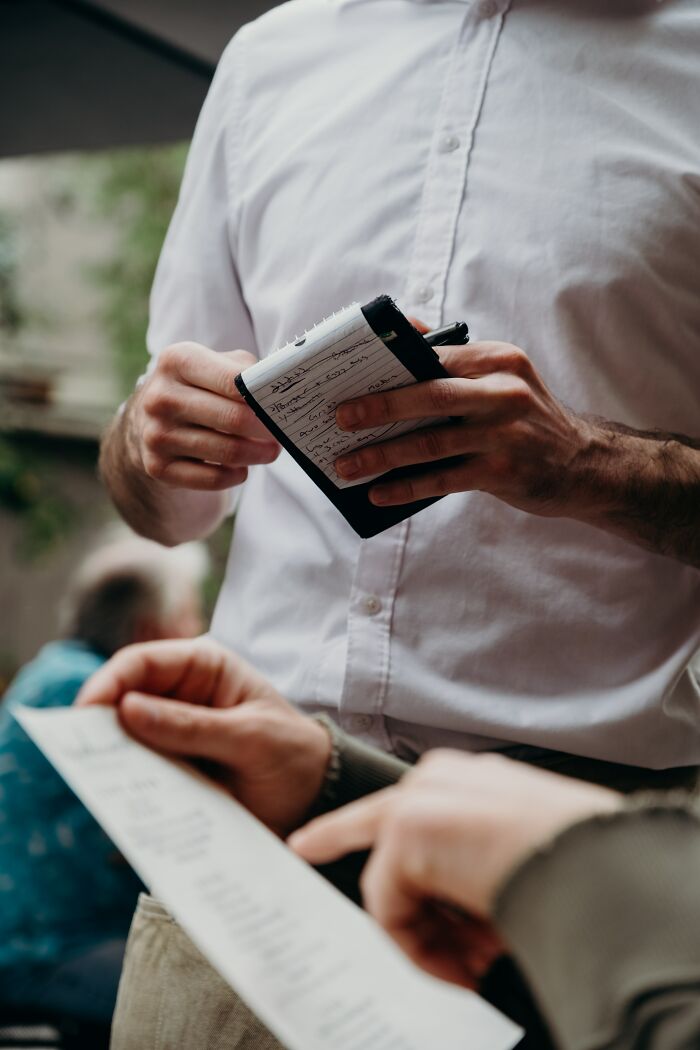 in vietnam, when you order in places with menus. The waiter will stare at you when you chose food
in vietnam, when you order in places with menus. The waiter will stare at you when you chose food
Netherlands
We celebrate blackfaced people helping an old dude on a horse delivering candy and presents to kids.
This info is off/incomplete. Not saying that wiki does give a 100% proper impression but its accurate enough: https://en.wikipedia.org/wiki/Sinterklaas.
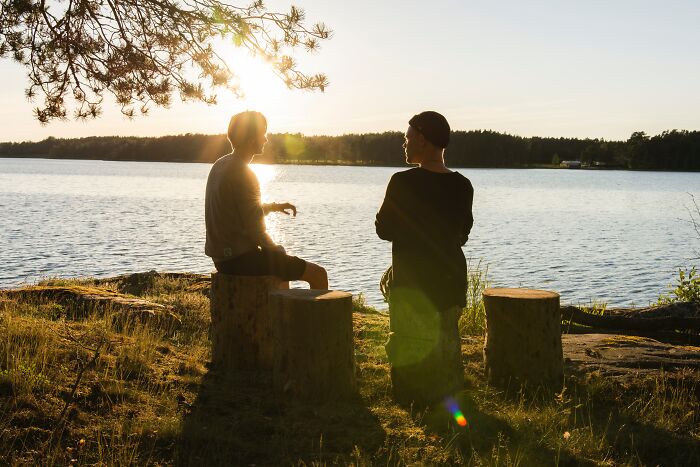 Apparently people don’t just walk up to strangers and start a conversation in other places. Friendly people here tend to do it and most actually don’t mind a little small talk.
Edit: apparently everyone does this everywhere except around the baltic and north seas
Apparently people don’t just walk up to strangers and start a conversation in other places. Friendly people here tend to do it and most actually don’t mind a little small talk.
Edit: apparently everyone does this everywhere except around the baltic and north seas
Sweden
Ever heard of a certain swedish controversy regarding guests?
USA
Saying Howdy
This is incredibly regional. And honestly a lot of people outside of the south hate the whole cowboy thing.
India
In India, it's totally normal and even encouraged to beat the s**t out of your children over the smallest things like scoring low or falling asleep in class. I remember that this "Very smart but acts out due to childhood trauma" kind off boy get beaten the s**t out of for getting 87% in an optional subject in 5th grade. I saw him getting the s**t beaten out of him by his parents when he didn't come to them when they called for him in the park. My mom was like "He is deffo going to shine in future and thank his parents for slapping him"
I just saw a video on this, same here in SA (south african indians)
India
head bobble
Interestingly we have a large indian population here in SA but they don't do this. What they do do is use "but" as a questionmark. "Are you going to the shops but?"
Greeting strangers as you walk past them on the street, maybe it’s a small town thing idk
It's just good manners to acknowledge someone politely and briefly. Even a head nod is better than pretending someone doesn't exist.
Czechoslovakia
Putting ice in beer.
To tip
You mean expecting customers to pay the employee's wage directly to them?
USA
I'd say not knowing geography, but I've met some dumb Western Europeans who have no grasp on the geography of Easten Europe. Like thinking Romania is another name for Italy.
Well, I remember Palin not knowing the difference between Czechia and Chechnya. If even American politicans don't know, how about the people?
Drinking beer like almost daily.
Australia
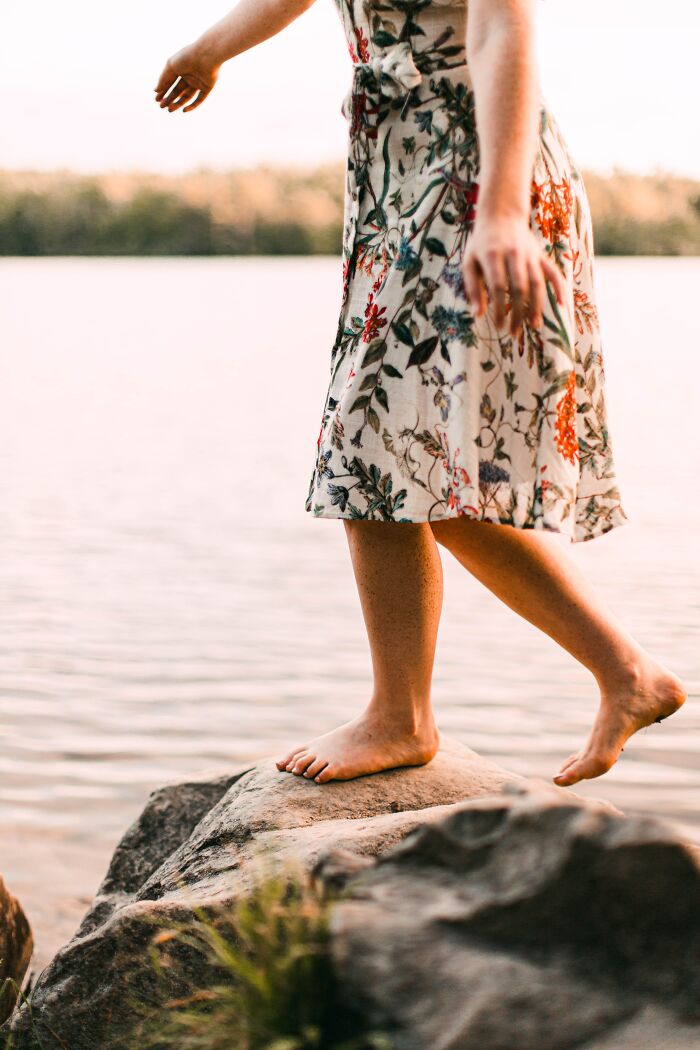 Touching elders' feet as a greeting and sign of respect
Touching elders' feet as a greeting and sign of respect
America
Marmite
In Mexico is very common to have people selling food on bike-carts yelling at the top of their lungs what they're selling. From very early in the morning till night. It's quite the background noise always hearing "Tamales!!!!" Or "Tortillas!!!", Etc. So you hear the yelling and you rush to the street, even if you're still in your PJ's, and men often get out just in their underwear too 😅
Yes! I remember that in California also. And guys with the little carts ringing bells selling icecream.
Load More Replies...In the Netherlands it's considered impolite *not* to finish your plate, even if you're full. In eastern European countries it's embarrassing for the host, if the guests finish their plates, because the host didn't give enough food. Imagine they are hosting a Dutch guest: plate empty, more food, guest finishes plate again. And again, and again. Till guest's stomach explodes...
I live in California & when my son was about 1 year old, when out in public Mexican women would always touch my son. He was quite chubby from being breastfed. I later learned it was good luck to touch a chubby baby. Also, I had a few unmarried coworkers who would freak if a broom came near their feet. Turns out, if her feet are touched whilst someone is sweeping, then she would never marry.
breastfeeding does not make a child chubby ... some kids are, some kids aren't.
Load More Replies...In Mexico is very common to have people selling food on bike-carts yelling at the top of their lungs what they're selling. From very early in the morning till night. It's quite the background noise always hearing "Tamales!!!!" Or "Tortillas!!!", Etc. So you hear the yelling and you rush to the street, even if you're still in your PJ's, and men often get out just in their underwear too 😅
Yes! I remember that in California also. And guys with the little carts ringing bells selling icecream.
Load More Replies...In the Netherlands it's considered impolite *not* to finish your plate, even if you're full. In eastern European countries it's embarrassing for the host, if the guests finish their plates, because the host didn't give enough food. Imagine they are hosting a Dutch guest: plate empty, more food, guest finishes plate again. And again, and again. Till guest's stomach explodes...
I live in California & when my son was about 1 year old, when out in public Mexican women would always touch my son. He was quite chubby from being breastfed. I later learned it was good luck to touch a chubby baby. Also, I had a few unmarried coworkers who would freak if a broom came near their feet. Turns out, if her feet are touched whilst someone is sweeping, then she would never marry.
breastfeeding does not make a child chubby ... some kids are, some kids aren't.
Load More Replies...
 Dark Mode
Dark Mode 

 No fees, cancel anytime
No fees, cancel anytime 









